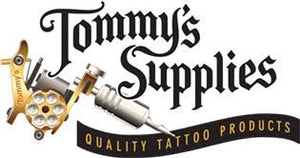Tattoo Starter Kit Essentials: What You Really Need to Begin Tattooing

TL;DR: If you’re just starting out as a tattoo artist, your starter kit should include a reliable tattoo machine (coil or rotary), compatible needles or cartridges, high-quality tattoo ink, a stable power supply, hygiene and sterilization tools, and practice skins. Choose reputable brands and prioritize safety and precision over low-cost bundles.
Starting a tattooing career is exciting, but it can also be overwhelming when it comes to choosing the right equipment. With so many kits and brands on the market, it’s easy to get lost in the noise. This guide will walk you through the real essentials every aspiring tattoo artist needs—and help you avoid wasting money on flashy extras you won’t use.
1. Tattoo Machine: Rotary or Coil?
Your machine is the heart of your setup. Most beginners opt for rotary machines because they are quieter, lighter, and easier to maintain. However, coil machines offer a more traditional feel and are known for their precision when lining and shading.
Top Tips:
- Look for machines with adjustable stroke length.
- Don’t buy knock-offs; invest in quality brands like Bishop, FK Irons, or Cheyenne.
Tattoo needles come in different groupings and configurations. For beginners, cartridges are often easier to use due to their quick swap-in/swap-out nature. Here are the basics:
- Round Liners (RL): For outlines
- Round Shaders (RS): For small shading areas
- Magnums (M1, M2): For filling and blending
Cartridge Tip: Make sure your machine is compatible with the cartridge system.
3. Tattoo Ink
Tattoo ink quality directly affects the outcome of your work and the safety of your clients. Avoid cheap inks and opt for reputable, FDA-compliant brands like StarBrite Colors, Dynamic, or Eternal Ink.
Essentials to Start:
- Black (lining & shading)
- White (highlights)
- Primary colors (red, blue, yellow) for practice and mixing
A stable power supply unit (PSU) helps maintain consistent voltage and machine performance. For beginners:
- Look for a digital PSU with a clear voltage display
- Voltage for liners: 6-9V | Shaders: 8-10V
- Foot pedal and clip cords or RCA cables are often included in beginner kits
Sanitation is critical. Even if you’re just practicing on fake skin, it pays to build good habits.
Must-Haves:
- Disposable gloves (nitrile preferred)
- Surface disinfectants (like Madacide)
- Barrier films, clip cord sleeves, and machine bags
- Autoclave (for later, once tattooing human skin)
6. Practice Skins and Accessories
Before you ever tattoo a person, practice is vital.
- Synthetic skin: Mimics real skin texture
- Fake limbs or 3D models: Great for simulating tricky body parts
- Stencil paper and transfer gel: To practice applying and following stencils accurately
- Tattoo machine stand or tray: Keeps your tools organized and safe
7. Optional But Useful
- Armrest or tattoo chair: Makes positioning easier
- Clip cord sleeves: For hygiene
- Green soap and squeeze bottles: For cleaning during tattooing
- Spray bottles: For water or disinfectants
Final Word: Don’t Buy “All-in-One” Cheap Kits
While they may seem convenient, most bundled kits include low-grade equipment. Instead, build your kit piece by piece. Start with fewer, high-quality items and expand as you grow.
FAQ
Q1: Can I start tattooing with a pen-style machine?
A: Yes, pen-style machines are beginner-friendly, especially for those coming from drawing backgrounds. They’re ergonomic and usually use cartridge needles.
Q2: Is it legal to tattoo at home?
A: In many places, it is illegal to tattoo without a license or outside a certified shop. Always check your local laws.
Q3: Do I need an autoclave for practicing?
A: Not initially if you’re only working on practice skins, but sterilization becomes critical once you begin tattooing real clients.
Q4: How much should I spend on a beginner setup?
A: Expect to spend $500–$1,000 for a reliable beginner setup. Prioritize quality over quantity.
Q5: Can I practice tattooing on fruit?
A: Yes, fruits like oranges or grapefruits are commonly used to simulate skin texture.
By investing in the right tools and building your kit mindfully, you’ll be laying a strong foundation for your tattoo career. Your work is only as good as your gear—and the care with which you use it.










